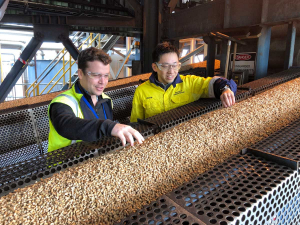Another Windfall for Fonterra Farmers, Unit Holders
Fonterra farmer shareholders and unit holders are in line for another payment in April.
 Fonterra employees Jonathon Milne and Kevin Liao during the wood pellet trial at Te Awamutu last year.
Fonterra employees Jonathon Milne and Kevin Liao during the wood pellet trial at Te Awamutu last year.
Fonterra is taking another step forward in its commitment to renewable energy.
From next season its Te Awamutu site will be coal free. Until now the site has used a combination of fuels to process milk - including coal.
This latest move, follows a trial last year and means it will switch from using coal at the end of this season, starting the 2020-21 season powering the boiler with wood pellets.
Fonterra’s sustainable energy and utility manager Linda Thompson says it’s an exciting step for the cooperative and, in particular, the Te Awamutu team.
“It really demonstrates that sustainability, doing what’s right for the long term good, is very much at the heart of how we’re working and thinking about our future.”
Last year, Fonterra announced a series of environmental targets relating to its coal use, manufacturing emissions and water efficiency, packaging and farm environment plans.
“The move to wood pellets at Te Awamutu will save the cooperative about 84,000 tonnes of carbon emissions every year, that’s the equivalent of taking around 32,000 cars off the road and will reduce Fonterra’s national coal consumption by approximately 10%.
“It’s a positive step forward as we look to reduce emissions and work towards net zero carbon emissions by 2050.”
The Te Awamutu site is one of three North Island sites that are currently using coal. Ms Thompson says the cooperative knows it’s got a big challenge ahead of it to get out of coal but it’s one that it’s up for.
“There is no one single solution for us to transition out of coal. We know we can’t do it alone, that’s why working with others like wood pellet supplier Nature’s Flame and the Energy Efficiency and Conservation Authority (EECA) are so important.”
Taupo based Nature’s Flame will be supplying the pellets made from sustainable wood fibre residues from the surrounding areas.
John Goodwin, Nature’s Flame’s operations manager says they’re excited to be partnering with Fonterra.
“We’re encouraged about the growth of the bioenergy (wood pellets) industry and we’re proud to be part of something that’s good for the environment and our local communities.”
EECA’s chief executive Andrew Caseley says “this project fully aligns with EECA’s purpose to help decarbonise the New Zealand economy.
“This is the largest boiler conversion project to biofuels to date, and this is why it has received $200,000 in funding from EECA’s technology demonstration programme. It also has the added benefit of establishing a more viable and large scale wood pellet supply chain.”
The Meat Industry Association of New Zealand (MIA) today announced that Chief Executive Officer Sirma Karapeeva has resigned from the role.
The winners of the 2026 Hawke’s Bay/Wairarapa Dairy Industry Awards were announced at the annual awards dinner held at Copthorne Solway Park in Masterton on Thursday evening.
Environment Southland is welcoming this week’s decision by the Environmental Protection Authority (EPA) to approve the release of Blaptea elguetai, a leaf‑feeding beetle that will help control the highly invasive Chilean flame creeper.
This March, the potato industry is proudly celebrating International Women’s Day on 8 March alongside the International Year of the Woman Farmer, recognising the vital role women play across every part of the sector — from paddocks and packhouses to research, leadership, and innovation.
Fruit trader Seeka posted a record profit and returns to shareholders in 2025.
Recent weather events in the Bay of Plenty, Gisborne/Tairawhiti, and Canterbury have been declared a medium-scale adverse event.
OPINION: Staying with politics, with less than nine months to go before the general elections, there’s confusion in the Labour…
OPINION: Winston Peters' tirade against the free trade deal stitched with India may not be all political posturing by the…